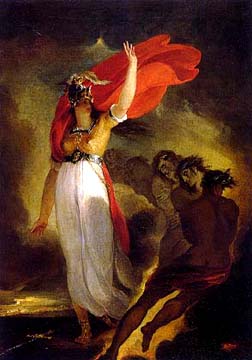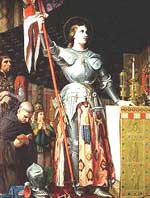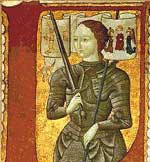History Online - Joan of Arc
[an error occurred while processing this directive]Joan of Arc
The maid of Orleans
"Your Highness says her Voices have revealed to you, by her mouth, a secret known only to yourself and God. How can you know that her Voices are not of Satan, and she his mouthpiece?--for does not Satan know the secrets of men and use his knowledge for the destruction of their souls? It is a dangerous business, and your Highness will do well not to proceed in it without probing the matter to the bottom."
That was enough. It shriveled up the King's little soul like a raisin, with terrors and apprehensions, and straightway he privately appointed a commission of bishops to visit and question Joan daily until they should find out whether her supernatural helps hailed from heaven or from hell.
The King's relative, the Duke of Alençon, three years prisoner of war to the English, was in these days released from captivity through promise of a great ransom; and the name and fame of the Maid having reached him--for the same filled all mouths now, and penetrated to all parts--he came to Chinon to see with his own eyes what manner of creature she might be. The King sent for Joan and introduced her to the Duke. She said, in her simple fashion:
"You are welcome; the more of the blood of France that is joined to this cause, the better for the cause and it."
Then the two talked together, and there was just the usual result: when they departed, the Duke was her friend and advocate.
Joan attended the King's mass the next day, and afterward dined with the King and the Duke. The King was learning to prize her company and value her conversation; and that might well be, for, like other kings, he was used to getting nothing out of people's talk but guarded phrases, colorless and non-committal, or carefully tinted to tally with the color of what he said himself; and so this kind of conversation only vexes and bores, and is wearisome; but Joan's talk was fresh and free, sincere and honest, and unmarred by timorous self-watching and constraint. She said the very thing that was in her mind, and said it in a plain, straightforward way. One can believe that to the King this must have been like fresh cold water from the mountains to parched lips used to the water of the sun-baked puddles of the plain.
After dinner Joan so charmed the Duke with her horsemanship and lance practice in the meadows by the Castle of Chinon whither the King also had come to look on, that he made her a present of a great black war-steed.
Every day the commission of bishops came and questioned Joan about her Voices and her mission, and then went to the King with their report. These pryings accomplished but little. She told as much as she considered advisable, and kept the rest to herself. Both threats and trickeries were wasted upon her. She did not care for the threats, and the traps caught nothing. She was perfectly frank and childlike about these things. She knew the bishops were sent by the King, that their questions were the King's questions, and that by all law and custom a King's questions must be answered; yet she told the King in her naïve way at his own table one day that she answered only such of those questions as suited her.
The bishops finally concluded that they couldn't tell whether Joan was sent by God or not. They were cautious, you see. There were two powerful parties at Court; therefore to make a decision either way would infallibly embroil them with one of those parties; so it seemed to them wisest to roost on the fence and shift the burden to other shoulders. And that is what they did. They made final report that Joan's case was beyond their powers, and recommended that it be put into the hands of the learned and illustrious doctors of the University of Poitiers. Then they retired from the field, leaving behind them this little item of testimony, wrung from them by Joan's wise reticence: they said she was a "gentle and simple little shepherdess, very candid, but not given to talking."
It was quite true--in their case. But if they could have looked back and seen her with us in the happy pastures of Domremy, they would have perceived that she had a tongue that could go fast enough when no harm could come of her words.
So we traveled to Poitiers, to endure there three weeks of tedious delay while this poor child was being daily questioned and badgered before a great bench of--what? Military experts?--since what she had come to apply for was an army and the privilege of leading it to battle against the enemies of France. Oh no; it was a great bench of priests and monks--profoundly leaned and astute casuists--renowned professors of theology! Instead of setting a military commission to find out if this valorous little soldier could win victories, they set a company of holy hair-splitters and phrase-mongers to work to find out if the soldier was sound in her piety and had no doctrinal leaks. The rats were devouring the house, but instead of examining the cat's teeth and claws, they only concerned themselves to find out if it was a holy cat. If it was a pious cat, a moral cat, all right, never mind about the other capacities, they were of no consequence.
Joan was as sweetly self-possessed and tranquil before this grim tribunal, with its robed celebrities, its solemn state and imposing ceremonials, as if she were but a spectator and not herself on trial. She sat there, solitary on her bench, untroubled, and disconcerted the science of the sages with her sublime ignorance--an ignorance which was a fortress; arts, wiles, the learning drawn from books, and all like missiles rebounded from its unconscious masonry and fell to the ground harmless; they could not dislodge the garrison which was within--Joan's serene great heart and spirit, the guards and keepers of her mission.
She answered all questions frankly, and she told all the story of her visions and of her experiences with the angels and what they said to her; and the manner of the telling was so unaffected, and so earnest and sincere, and made it all seem so lifelike and real, that even that hard practical court forgot itself and sat motionless and mute, listening with a charmed and wondering interest to the end. And if you would have other testimony than mine, look in the histories and you will find where an eyewitness, giving sworn testimony in the Rehabilitation process, says that she told that tale "with a noble dignity and simplicity," and as to its effect, says in substance what I have said. Seventeen, she was--seventeen, and all alone on her bench by herself; yet was not afraid, but faced that great company of erudite doctor4s of law ant theology, and by the help of no art learned in the schools, but using only the enchantments which were hers by nature, of youth, sincerity, a voice soft and musical, and an eloquence whose source was the heart, not the head, she laid that spell upon them. Now was not that a beautiful thing to see? If I could, I would put it before you just as I saw it; then I know what you would say.
As I have told you, she could not read. "One day they harried and pestered her with arguments, reasonings, objections, and other windy and wordy trivialities, gathered out of the works of this and that and the other great theological authority, until at last her patience vanished, and she turned upon them sharply and said:
"I don't know A from B; but I know this: that I am come by command of the Lord of Heaven to deliver Orleans from the English power and crown the King of Rheims, and the matters ye are puttering over are of no consequence!"
Necessarily those were trying days for her, and wearing for everybody that took part; but her share was the hardest, for she had no holidays, but must be always on hand and stay the long hours through, whereas this, that, and the other inquisitor could absent himself and rest up from his fatigues when he got worn out. And yet she showed no wear, no weariness, and but seldom let fly her temper. As a rule she put her day through calm, alert, patient, fencing with those veteran masters of scholarly sword-play and coming out always without a scratch.
One day a Dominican sprung upon her a question which made everybody cock up his ears with interest; as for me, I trembled, and said to myself she is done this time, poor Joan, for there is no way of answering this. The sly Dominican began in this way--in a sort of indolent fashion, as if the thing he was about was a matter of no moment:
"You assert that God has willed to deliver France from this English bondage?"
"Yes, He has willed it."
"You wish for men-at-arms, so that you may go to the relief of Orleans, I believe?"
"Yes--and the sooner the better."
"God is all-powerful, and able to do whatsoever thing He wills to do, is it not so?"
"Most surely. None doubts it."
The Dominican lifted his head suddenly, and sprung that question I have spoken of, with exultation:
"Then answer me this. If He has willed to deliver France, and is able to do whatsoever He wills, where is the need for men-at-arms?"
There was a fine stir and commotion when he said that, and a sudden thrusting forward of heads and putting up of hands to ears to catch the answer; and the Dominican wagged his head with satisfaction, and looked about him collecting his applause, for it shone in every face. But Joan was not disturbed. There was no note of disquiet in her voice when she answered:
"He helps who help themselves. The sons of France will fight the battles, but He will give the victory!"
You could see a light of admiration sweep the house from face to face like a ray from the sun. Even the Dominican himself looked pleased, to see his master-stroke so neatly parried, and I heard a venerable bishop mutter, in the phrasing common to priest and people in that robust time, "By God, the child has said true. He willed that Goliath should be slain, and He sent a child like this to do it!"
Another day, when the inquisition had dragged along until everybody looked drowsy and tired but Joan, Brother Séguin, professor of theology at the University of Poitiers, who was a sour and sarcastic man, fell to plying Joan with all sorts of nagging questions in his bastard Limousin French--for he was from Limoges. Finally he said:
"How is it that you understand those angels? What language did they speak?"
"French."
"In-deed! How pleasant to know that our language is so honored! Good French?"
"Yes--perfect."
"Perfect, eh? Well, certainly you ought to know. It was even better than your own, eh?"
"As to that, I--I believe I cannot say," said she, and was going on, but stopped. Then she added, almost as if she were saying it to herself, "Still, it was an improvement on yours!"
I knew there was a chuckle back of her eyes, for all their innocence. Everybody shouted. Brother Séguin was nettled, and asked brusquely:
"Do you believe in God?"
Joan answered with an irritating nonchalance:
"Oh, well, yes--better than you, it is likely."
Brother Séguin lost his patience, and heaped sarcasm after sarcasm upon her, and finally burst out in angry earnest, exclaiming:
"Very well, I can tell you this, you whose believe in God is so great: God has not willed that any shall believe in you without a sign. Where is your sign?--show it!"
This roused Joan, and she was on her feet in a moment, and flung out her retort with spirit:
"I have not come to Poitiers to show signs and do miracles. Send me to Orleans and you shall have signs enough. Give me men-at-arms--few or many--and let me go!"
The fire was leaping from her eyes--ah, the heroic little figure! can't you see her? There was a great burst of acclamations, and she sat down blushing, for it was not in her delicate nature to like being conspicuous.
This speech and that episode about the French language scored two points against Brother Séguin, while he scored nothing against Joan; yet, sour man as he was, he was a manly man, and honest, as you can see by the histories; for at the Rehabilitation he could have hidden those unlucky incidents if he had chosen, but he didn't do it, but spoke them right out in his evidence.
On one of the lat3er days of that three-weeks session the gowned scholars and professors made one grand assault all along the line, fairly overwhelming Joan with objections and arguments culled from the writings of every ancient and illustrious authority of the Roman Church. She was well-nigh smothered; but at last she shook herself free and struck back, crying out:
"Listen! The Book of God is worth more than all these ye cite, and I stand upon it. And I tell ye there are things in that Book that not one among ye can read, with all your learning!"
From the first she was the guest, by invitation, of the dame De Rabateau, wife of a councilor of the Parliament of Poitiers; and to that house the great ladies of the city came nightly to see Joan and talk with her; and not these only, but the old lawyers, councilors and scholars of the Parliament and the University. And these grave men, accustomed to weigh every strange and questionable thing, and cautiously consider it, and turn it about this way and that and still doubt it, came night after night, and night after night, falling ever deeper and deeper under the influence of that mysterious something, that spell, that elusive and unwordable fascination, which was the supremest endowment of Joan of Arc, that winning and persuasive and convincing something which high and low alike recognized and felt, but which neither high nor low could explain or describe, and one by one they all surrendered, saying, "This child is sent of God."
All day long Joan, in the great court and subject to its rigid rules of procedure, was at a disadvantage; her judges had things their own way; but at night she held court herself, and matters were reversed, she presiding, with her tongue free and her same judges there before her. There could not be but one result: all the objections and hindrances they could build around her with their hard labors of the day she would charm away at night. In the end, she carried her judges with her in a mass, and got her great verdict without a dissenting voice.
The court was a sight to see when the president of it read it from his throne, for all the great people of the town were there who could get admission and find room. First there were some solemn ceremonies, proper and usual at such times; then, when there was silence again, the reading followed, penetrating the deep hush so that every word was heard in even the remotest parts of the house:
"It is found, and is hereby declared, that Joan of Arc, called the Maid, is a good Christian and a good Catholic; that there is nothing in her person or her words contrary to the faith; and that the King may and ought to accept the succor she offers; for to repel it would be to offend the Holy Spirit, and render him unworthy of the air of God."
The court rose, and then the storm of plaudits burst forth unrebuked, dying down and bursting forth again and again, and I lost sight of Joan, for she was swallowed up in a great tide of people who rushed to congratulate her and pour out benedictions upon her and upon the cause of France, now solemnly and irrevocably delivered into her little hands.
Personal Recollections of Joan of Arc
By Mark Twain
 WHEN JOAN told the King what that deep secret was that was torturing his heart, his doubts were cleared away; he believed she was sent of God, and if he had been let alone he would have set her upon her great mission at once. But he was not let alone. Tremouille and the holy fox of Rheims knew their man. All they needed to say was this--and they said it:
WHEN JOAN told the King what that deep secret was that was torturing his heart, his doubts were cleared away; he believed she was sent of God, and if he had been let alone he would have set her upon her great mission at once. But he was not let alone. Tremouille and the holy fox of Rheims knew their man. All they needed to say was this--and they said it:
Biography
At the time of Joan's childhood the land of France was caught up in the Hundred Year's War. Joan's home town of Domremy was placed somewhat in between the forces of the English and the French. Although Joan had a relatively pleasant and simple childhood, occasionally she and her family had to flee from armies passing through their town.
Joan started hearing voices at the age of 13. These voices originally only exhorted her to pray often and attend church. After a year or two they started telling her that she must help the dauphin, or future king, of France be crowned. The dauphin, Charles VII, had to be coronated at Reims by tradition, but at that time Reims was held by the English, with their own hopes of crowning Henry VI, who was but a child, when he was old enough.
Joan left her home town without telling her parents and managed to get to the King and convince him of the sincerity of her mission. She was supplied with an army to raise the siege of Orleans, the first necessary step to reaching Reims. Despite the bumbling and lack of faith of her fellow commanders, the siege was lifted with full credit going to Joan. From there it seemed that Joan could do no wrong in battle until she reached Reims and the King was coronated. After this, Joan's successfulness started declining, mainly thanks to the lack of monetary support from King Charles VII. She was captured at Compiègne when the drawbridge was raised too hastily, resulting in Joan being left outside.
Joan was tried by an English inquisition court, found to be heretical, and burned at the stake.
 Perhaps one of the most distinguished, and most often forgotten, creative contributions of Joan of Arc was Joan's patriotism. Before Joan, there was no sense of "France" or "English." To the people of her time, those words meant only the actual land of France and England, not the nations. Joan was the first leader to consider those two countries separate. Even the dauphin and future king of France, Charles VII, felt uneasy about his claim to be the King since Henry VI also claimed the same position. Until Joan, the possibility that there might be two kings was not seriously considered. Either Henry VI was the King of France and England, or Charles VII was. With Joan came the sense of nationalism for the French.
Perhaps one of the most distinguished, and most often forgotten, creative contributions of Joan of Arc was Joan's patriotism. Before Joan, there was no sense of "France" or "English." To the people of her time, those words meant only the actual land of France and England, not the nations. Joan was the first leader to consider those two countries separate. Even the dauphin and future king of France, Charles VII, felt uneasy about his claim to be the King since Henry VI also claimed the same position. Until Joan, the possibility that there might be two kings was not seriously considered. Either Henry VI was the King of France and England, or Charles VII was. With Joan came the sense of nationalism for the French.
Joan drove home her viewpoint with the English during her trial. She was often asked whether God loved France more than England. Joan prudently responded that God wanted the English to stay in their own lands.
 Above all, Joan was a devout catholic. The main reason she was unwilling to submit to church authority during her trial (which actually became the main accusation during her trial--her unwillingness to submit to the church) was because she was being held by the English, not the church. When asked if she would submit to her judges, who promoted themselves to be in authority from the church (but were really just English dupes), Joan replied, "I will answer you. On submission to the Church . . . I have said that all the works which I have said and done should be submitted to Rome to our lord the supreme pontiff, to whom, after God, I refer myself. And as for my words and deeds, I did them on behalf of God." On her way to be burned, she told her main prosecutor, Cauchon, "Alas! If you had put me in Church prisons and in the hands of competent and suitable Church guards, this would not have happened; that is why I appeal to God about you."
Above all, Joan was a devout catholic. The main reason she was unwilling to submit to church authority during her trial (which actually became the main accusation during her trial--her unwillingness to submit to the church) was because she was being held by the English, not the church. When asked if she would submit to her judges, who promoted themselves to be in authority from the church (but were really just English dupes), Joan replied, "I will answer you. On submission to the Church . . . I have said that all the works which I have said and done should be submitted to Rome to our lord the supreme pontiff, to whom, after God, I refer myself. And as for my words and deeds, I did them on behalf of God." On her way to be burned, she told her main prosecutor, Cauchon, "Alas! If you had put me in Church prisons and in the hands of competent and suitable Church guards, this would not have happened; that is why I appeal to God about you."
Joan's devotion to religion, despite her military career, were truly remarkable. She even required that her soldiers be "well confessed and repentant and of good will." Joan also stopped in every town she passed through, when it was possible, so she could attend mass.

